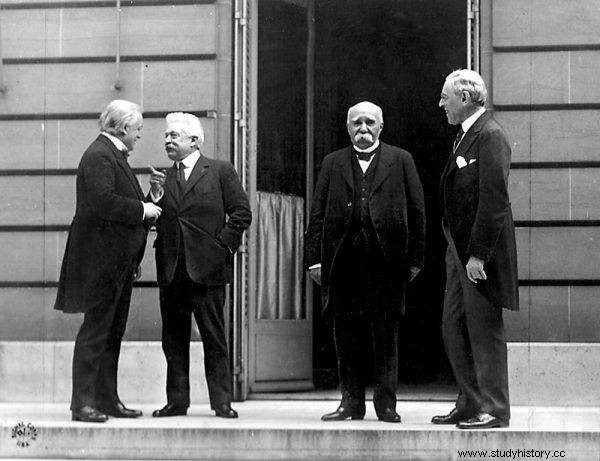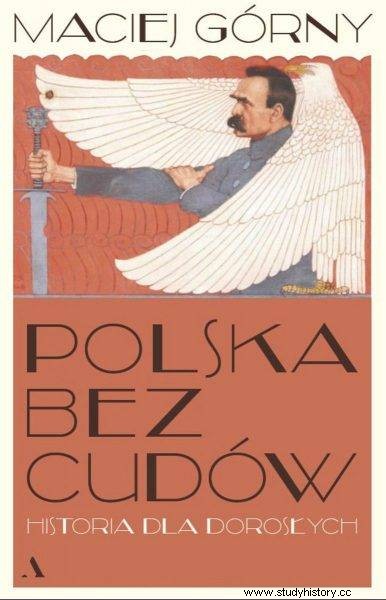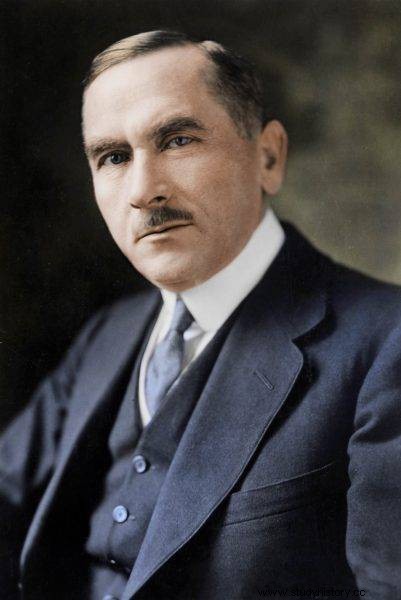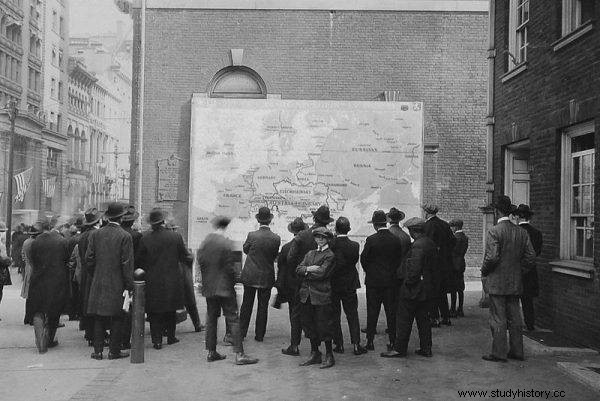World War I ended with the Peace of Versailles, with which no one was satisfied. Who and on what basis established the borders of states in the new reality?
In July 1919, representatives of both the victorious and losing countries of the First World War gathered in Paris. A peace conference was organized to agree on a new order:establish boundaries and resolve disputes.
The star of the talks was the president of the United States, Woodrow Wilson, who proposed a completely new approach to politics. He promoted morality and transparency, as well as the right of nations to self-determination. Maciej Górny in the book "Poland without miracles" writes:
In theory, everyone liked Wilson's principles and its allies - France, Great Britain and Italy - did not think they could clash with their interests. The defeated Germans, in turn, hoped that the right to self-determination would also apply to them and therefore there will be no major territorial losses. Both were disappointed.
Offended Italians
At the very beginning of the meeting, it was agreed that all decisions would be made by the Council of Ten composed of representatives (heads of government and ministers of foreign affairs) of the great powers:France, Japan, Great Britain, the USA and Italy. This arrangement did not last long, however.
Under the secret agreement concluded in London, Italy was to receive part of the Austro-Hungarian territories, up to Dalmatia. So President Vittorio Orlando and Foreign Minister Sidney Sonnino were under pressure. Unfortunately, the Council vehemently opposed the expectations of the Italians. A dispute flared up, and Woodrow Wilson chose to speak directly to the Italian public in Le Monde. In his opinion, the winners were responsible for the new order in Europe so they should settle for land grabbing in Tyrol.

The Great Four of World War I:David Lloyd George, Vittorio Emanuele Orlando, Georges Clemenceau, and US President Woodrow Wilson.
As you'd expect, Wilson's arguments appealed to a wide audience ... except in Italy. The president and the minister of external affairs left Paris in protest, being covered with mud for "betraying the national interest." It was then that crystallized the term vittoria mutilata , or "crippled victory."
Meanwhile, the decision-making team was going through rapid changes. Maciej Górny in "Poland without miracles" reports:
The Council of Ten in practice soon became the Council of Five with one representative of each power . The Western countries' ignoring Japan soon resulted in the formation of the Council of Four, and as the leaders of the powers treated Italy's aspirations with a similar disregard, ended with the Council of Three .
More and more elite debates became less and less open with time, which contributed to the deterioration of the atmosphere of negotiations. The president of the United States was still a part of them, but the process he was co-sponsoring was far from his recently proclaimed ideals.
A row over the east
The peace conference certainly did not like it, and the Germans blamed all the blame for causing the world war. The penalties were severe: huge damages, demilitarization of the country, taking the colony away and - contrary to Wilson's assurances - loss of part of the territory . The Reich "impoverished" a lot of land. Also those with the majority of the German population.
Moreover, Germany was forbidden to unite the Weimar Republic and Austria. Thus, the demands of the political elite and public opinion were ignored. The worst - like a kick for a lying person - were the changes in the east. New neighbors appeared who, to make matters worse, benefited from the peace decisions. Poles, Croats, Serbs and Slovenes were given their territories. However, decisions about their boundaries were made in the sweat of the brow…

The text was created, among others based on the book by Maciej Górny “Polska bez cudów. A story for adults ”, which has just been released by Agora publishing house.
The envoys of the countries of Eastern Europe, although they showed real heroism in the eyes of their compatriots, were received at the conference with a pinch of salt. Heavily truncated The Council did not give Dmowski and Paderewski - the Polish delegates - too many opportunities to speak and preferred to ask questions rather than listen to arguments, which the embittered Dmowski later described in his accounts. Other representatives of eastern countries had similar impressions.
The tragedy of mistakes
The atmosphere among the diplomats was tense. Widely regarded as arrogant and constantly excluded from the conversations, Dmowski looked for "Jewish conspiracies" everywhere. Romanian Prime Minister Ion Brătianu was so frustrated by the "disrespectful attitude" of the powers to his cause that he ostentatiously missed the conference.

Widely regarded as arrogant and constantly excluded from conversations, Dmowski looked for "Jewish conspiracies" everywhere.
Worse still, during the negotiations it was constantly revealed that the parties were trying to bend reality by twisting the statistics and boundaries on the maps, which the Council had big problems in making decisions . It is also worth mentioning that politicians did not necessarily know the problems of the East as well as the delegates, so they were often wrong and could not fully understand what the blame for selected regions resulted from.
Get your head on
In the end, the voice of experts encouraged by science was reached. Therefore, the Council of Three relied on materials prepared by scientists who, in case of doubts, recruited specialists from specific fields known in the university community to explain the disputed issues.
This is how, among others, Eugeniusz Romer appeared in the company, providing important information on the distribution of the population about Polish national identity. In the end, it can be said that the borders set for Poland, Czechoslovakia and the Kingdom of Serbs, Croats and Slovenes were the result of the work of scholars, not politicians .
The Polish case in Paris
The victorious powers supported the necessity of the Polish state not only because of the claims of the nation. The country could also be a kind of barrier separating Europe from communism. Therefore, apart from the brave Greater Poland, which liberated itself from the partitions, Poland received the Pomeranian belt (without Gdańsk), and plebiscites were to be held in Silesia, Warmia and Mazury.
The eastern border was established along the line of the Niemen - Grodno - Vilnius - Dyneburg, but due to the Polish-Bolshevik war did not become permanent until later . And while the Council's decisions may sound pretty good, in fact, they turned out to be another failure and the cause of bloodshed during the purges and uprisings. Maciej Górny sums up:
In the end the decisions of the peace conference disappointed almost everyone, even those countries that could seem to be undisputed beneficiaries new order. It is easiest to understand the frustration of the losers - forced to pay reparations and deprived of a part of the territory (sometimes, as in the case of Hungary, the larger one).

In Paris, it was agreed what the map of Europe will look like in the new, post-war reality
But also the hopes of the winners did not come true. Germany has not been weakened as much as France wished it to be. Italy gained less than it had hoped for, as did Yugoslavia, which had to give up part of its Hungarian territory to Romania.
Poland's territorial gains at the expense of Germany and the Kingdom of Serbs, Croats and Slovenes at the expense of Austria weakened the plebiscites in which the majority of voters, regardless of ethnic origin, opted for maintaining their current affiliation state. Even Romania, which had basically everything it sought, did not drown in universal joy .
Bibliography:
- Gerwarth, R., Defeated . Rebis Publishing House, Poznań, 2017.
- Górny, M., Poland without miracles . Agora Publishing House, Warsaw, 2021.
- Pajewski, J., World War I 1914-1918 . Polish Scientific Publishers PWN, Warsaw, 2019.
